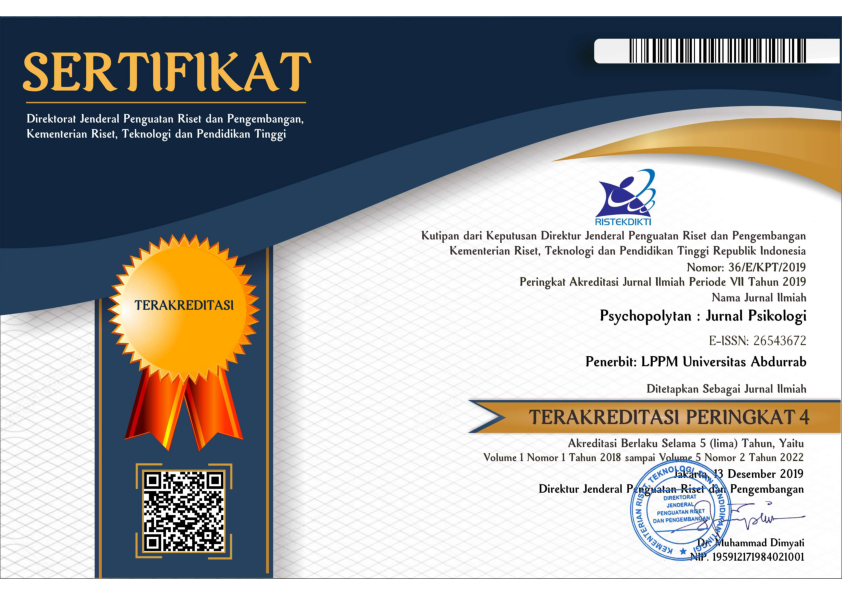Resiliensi Akademik dengan Kepuasan Belajar Online pada Mahasiswa
(Submitted 29 November 2020) (Published 31 Agustus 2021)
Abstract
Pandemi Covid-19 berdampak pada mahasiswa belajar dari rumah secara online (daring) selama masa karantina dapat menurunkan motivasi mahasiswa karena kepuasan belajar menjadi terganggu akibat literasi digital yang rendah dan penyesuaian belajar saat di rumah. Masalah-masalah psikologis juga timbul, sehingga dibutuhkan ketahanan psikologis menghadapi situasi yang tidak menyenangkan dan kemampuan beradaptasi, yaitu resiliensi akademik untuk menjadi faktor kepuasan belajar online pada mahasiswa selama pandemi Covid-19. Tujuan penelitian ini adalah untuk mengetahui hubungan resiliensi akademik dengan kepuasan belajar online pada mahasiswa selama proses pembelajaran jarak jauh. Metode penelitian dibagi dalam dua tahap yakni secara kualitatif melalui 19 buah pertanyaan terbuka kepada 11 orang mahasiswa untuk merumuskan konstruk pengukuran dan secara kuantitatif menguji validitas aitem pengukuran tersebut dengan program SPSS pada 116 mahasiswa melalui survei google form. Dari hasil uji korelasi pearson sebesar 0.473 dan P<0.000 , maka diperoleh hubungan antara resiliensi akademik dengan kepuasan belajar online, sehingga kesimpulan penelitian ini yaitu hipotesa diterima. Hasil penelitian ini bermanfaat bagi mahasiswa untuk meningkatkan faktor-faktor kepuasan selama belajar dari rumah, salah satunya melalui faktor resiliensi, yang akan dibahas pada tulisan ini.
References
Alhazzani, N. (2020). MOOC’s impact on higher education. Social Sciences & Humanities Open, 2(May), 1–11. https://doi.org/10.1016/j.ssaho.2020.100030
Amado, C. M., Minahk, C. J., Cilli, E., Oliveira, G., & Dupuy, F. G. (2019). Jo ur l P re. BBA - Biomembranes, 183135. https://doi.org/10.1016/j.bbamem.2019.183135
Anghela, R. E. (2015). Psychological and Educational Resilience in High vs. Low-Risk Romanian Adolescents. Procedia - Social and Behavioral Sciences, 203, 153–157. https://doi.org/10.1016/j.sbspro.2015.08.274
Bauer, M. (2019). Translating a Successful Lecture into Online Course Content-Experiences of a Control Engineering Lecturer. IFAC-PapersOnLine, 52(9), 312–317. https://doi.org/10.1016/j.ifacol.2019.08.220
Carolan, C., Davies, C. L., Crookes, P., McGhee, S., & Roxburgh, M. (2020). COVID 19: Disruptive impacts and transformative opportunities in undergraduate nurse education. Nurse Education in Practice, 46(May), 102807. https://doi.org/10.1016/j.nepr.2020.102807
Cassidy, S. (2016). The Academic Resilience Scale (ARS-30): A new multidimensional construct measure. Frontiers in Psychology, 7(NOV), 1–11. https://doi.org/10.3389/fpsyg.2016.01787
Cheok, M. L., & Wong, S. L. (2015). Predictors of E-learning satisfaction in teaching and learning for school teachers: A literature review. International Journal of Instruction, 8(1), 75–90. https://doi.org/10.12973/iji.2015.816a
Deshwal, P., Trivedi, A., & Himanshi, H. L. N. (2017). Online Learning Experience Scale Validation and Its Impact on Learners’ Satisfaction. Procedia Computer Science, 112, 2455–2462. https://doi.org/10.1016/j.procs.2017.08.178
Dohaney, J., de Róiste, M., Salmon, R. A., & Sutherland, K. (2020). Benefits, barriers, and incentives for improved resilience to disruption in university teaching. International Journal of Disaster Risk Reduction, 50. https://doi.org/10.1016/j.ijdrr.2020.101691
Ebulum, G. C. (2016). Resilience , Gender and Age as Predictors of Satisfaction with Academic Major among University Undergraduates. International Journal of Research in Engineering and Social Sciences, 6(04), 13–23.
Handayani, L. (2020). Keuntungan , Kendala dan Solusi Pembelajaran Online Selama Pandemi Covid-19 : Studi Ekploratif di SMPN 3 Bae Kudus. Journal Industrial Engineering & Management Research, 1(2), 16.
Ikhsan, R. B., Saraswati, L. A., Muchardie, B. G., Vional, & Susilo, A. (2019). The determinants of students’ perceived learning outcomes and satisfaction in BINUS online learning. Proceedings of 2019 5th International Conference on New Media Studies, CONMEDIA 2019, April, 68–73. https://doi.org/10.1109/CONMEDIA46929.2019.8981813
Kumalasari, D., & Akmal, S. Z. (2020). Resiliensi akademik dan kepuasan belajar daring di masa pandemi COVID-19: Peran mediasi kesiapan belajar daring. Jurnal Psikologi Indonesia, 9(2). https://doi.org/https://doi.org/10.30996/persona.v9i2.4139
Kuo, Y. C., Walker, A. E., Belland, B. R., & Schroder, K. E. E. (2013). A predictive study of student satisfaction in online education programs. International Review of Research in Open and Distance Learning, 14(1), 16–39. https://doi.org/10.19173/irrodl.v14i1.1338
Lestiyanawati, R., & Widyantoro, A. (2020). The Strategies and Problems Faced by Indonesian Teachers in Conducting e-learning during COVID-19 Outbreak. CLLiENT (Culture, Literature, Linguistics, and English Teaching), 2(1), 71–82. https://doi.org/10.32699/cllient.v2i1.1271
Meneghel, I., Martínez, I. M., Salanova, M., & Witte, H. (2019). Promoting academic satisfaction and performance: Building academic resilience through coping strategies. Psychology in the Schools, 56(6), 875–890. https://doi.org/10.1002/pits.22253
Nam, M. H., & Kim, H. O. (2018). Effect of Personality and Resilience on Satisfaction with Major in Nursing Students. Journal of Korean Academy of Nursing Administration, 24(4), 298-306. https://doi.org/10.11111/jkana.2018.24.4.298
Rosali, E. S. (2020). Aktifitas Pembelajaran Daring Pada Masa Pandemi Covid-19 Di Jurusan Pendidikan Geografi Universitas Siliwangi Tasikmalaya. Geography Science Education Journal (GEOSEE), 1(1), 21–30. https://www.researchgate.net/publication/340917125_Kendala_Pelaksanaan_Pembelajaran_Jarak_Jauh_PJJ_dalam_Masa_Pandemi/stats
Sagone, E., & Caroli, M. E. De. (2013). Relationships between Resilience, Self-Efficacy, and Thinking Styles in Italian Middle Adolescents. Procedia - Social and Behavioral Sciences, 92(Lumen), 838–845. https://doi.org/10.1016/j.sbspro.2013.08.763
Sleiwah, A., Mughal, M., & Roblin, P. (2020). COVID-19 Lockdown Learning: The uprising of Virtual Teaching. Journal of Plastic, Reconstructive & Aesthetic Surgery. https://doi.org/10.1016/j.bjps.2020.05.032
Vinkers, C. H., van Amelsvoort, T., Bisson, J. I., Branchi, I., Cryan, J. F., Domschke, K., Manchia, M., Pinto, L., de Quervain, D., Schmidt, M. V., & van der Wee, N. (2020). Stress resilience during the coronavirus pandemic. European Neuropsychopharmacology, 35, 12–16. https://doi.org/10.1016/j.euroneuro.2020.05.003
Yasir, M., Suarman, S., & Gusnardi, G. (2017). Analisis Tingkat Kepuasan Siswa dan Motivasi Dalam Pembelajaran Kelompok (Cooperative Learning) dan Kaitannya Dengan Hasil Belajar Akuntansi di SMK Labor Binaan FKIP UNRI Pekanbaru. Jurnal Pekbis, Volume 9(2), 77–90.
Zhai, Y., & Du, X. (2020). Addressing collegiate mental health amid COVID-19 pandemic. Psychiatry Research, 288(April), 113003. https://doi.org/10.1016/j.psychres.2020.113003
Copyright (c) 2021 Psychopolytan : Jurnal Psikologi

This work is licensed under a Creative Commons Attribution-NonCommercial-ShareAlike 4.0 International License.
1. Copyright of all journal manuscripts is held by the Psychopolytan : Jurnal Psikologi
2. Formal legal provisions to access digital articles of electronic journal are subject to the provision of the Creative Commons Attribution-ShareAlike license (CC BY-NC-SA), which means that Psychopolytan : Jurnal Psikologi is rightful to keep, transfer media/format, manage in the form of databases, maintain, and publish articles.
3. Published manuscripts both printed and electronic are open access for educational, research, and library purposes. Additionally, the editorial board is not responsible for any violations of copyright law.
licensed under a Creative Commons Attribution-ShareAlike 4.0 International License.
 pdf
pdf
 Abstract views: 3036
Abstract views: 3036
 downloads: 2392
downloads: 2392

 :
:








